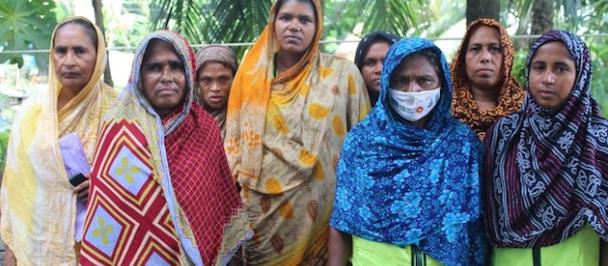©UNDP Bangladesh
When 35-year-old Jashim migrated to Chattogram from Charfasson, a remote Upazila of Bhola district in Bangladesh, some ten years ago, he thought that he would never be able to move back.
Whatever little property he had was lost to Meghna river’s erosion, caused by climate change, and the father of two boys was forced to a future of working as a day-labourer in the mega city.
Climate change has been driving more and more people to move from coastal areas to the slums of big cities like Dhaka or Chattogram searching for livelihood options as they lose their lands, due to sudden onset disasters like cyclones, river erosion or long-term problems like increased salinity.
But when Jashim came back to Charfasson to visit his family a few months later, he learned of a new United Nations Development Programme (UNDP) initiative in his area.
The Integrating Community-based Adaptation into Afforestation and Reforestation (ICBAAR) project, launched in 2016, aims to curb the adverse effects of climate change and introduce adaptive livelihood options for the vulnerable people of the coastal islands.
Jashim, who was already close to a burnout due to the excessive stresses of city life and adverse working conditions, decided to give it a try.
He joined 25 other people to tryout ‘Sorjone Fish Culture’, a nature-based climate-resilient livelihood solution, introduced under the project in the coastal areas. The multiple-use land management method is used to cultivate different fish and vegetables through excavation of ditches and dykes in the target area.
In their case, the target area was 13 acres of leased land, which otherwise would be unproductive throughout the year due to saline water intrusion and water logging.
Although a little skeptical at first, Jashim quickly started gaining his confidence when he started realising that the technique was appropriate for coastal areas and the effects of climate change.
After four months of effort, the first produce of vegetables hit the market bringing in close to Tk 3 lakhs (3540 USD). Jashim got a Tk 30,000 (354 USD) share from the sale of vegetables only and was eyeing a similar amount at the end of the year from sale of fishes and vegetables.
Maruf Hossain Minar, a senior fisheries officer who overviewed ICBAAR activities, said, “By the end of the year, they bagged another Tk 6 lakhs from the sale of fishes farmed in the area.”
“The amount of food I grew was enough for my family as well,” he said. “It was then that I decided that I won’t be going back to the noisy city anymore. My life here with my family is much more dignified. Now my wife is also involved in my work here,” said Jashim.
The ICBAAR project till now has succeeded in changing lives for over 10,000 households of coastal areas, and is expected to benefit over 60,000 people who are at risk due to climate change.

 Locations
Locations




